Last Updated on September 22, 2022
In this article, we’re going to discuss the symptoms of bad valve seals and piston rings, as well as their basic functions and common replacement costs. Valve seals and piston rings are crucial for your engine to function.
If you learn to recognize the warning signs for these components, you’ll be able to replace them before any serious damage is done to your engine.
Functions of Piston Rings
Piston rings are located between the piston and cylinder and provide four different functions:
- Compression Seal: The ring creates a seal, preventing combustion gasses from leaking out of the chamber. Leaks can drastically reduce engine performance.
- Heat Transfer: Every time combustion occurs, the internal temperature of the chamber spikes. These high temperatures can cause serious damage. A piston ring helps transfer this excess heat from the piston head to the cylinder, reducing the risk of heat damage.
- Lubrication Control: A film of oil is necessary to keep the piston lubricated. The piston ring helps regulate the amount of oil that reaches the piston.
- Piston Support: The piston works on a crank and could easily bang into the cylinder wall if not for the piston ring’s padded support.
It is important to note that piston rings wear out, which means you’ll likely need to have them replaced at some point.
Functions of Valve Stem Seals
Valves regulate how much of the fuel mixture enters the cylinder. The valve itself has a seal (and sometimes a protective sleeve) to help prevent leakage of combustion gasses and prevent oil from leaking into the main engine area.
These seals are commonly constructed out of a super strength rubber material and they’re placed into a small collar of the valve stem’s top area. Once these valve seals start to wear out, you’ll begin to notice some major symptoms that are unique to this problem.
Symptoms of Bad Valve Seals and Piston Rings
Bad valve seal or piston ring symptoms are quite similar. Whenever either fails, the performance of the vehicle will drop, and other symptoms will manifest. Let’s take a look at some warning signs that these components are going bad:
#1 – Exhaust Smoke
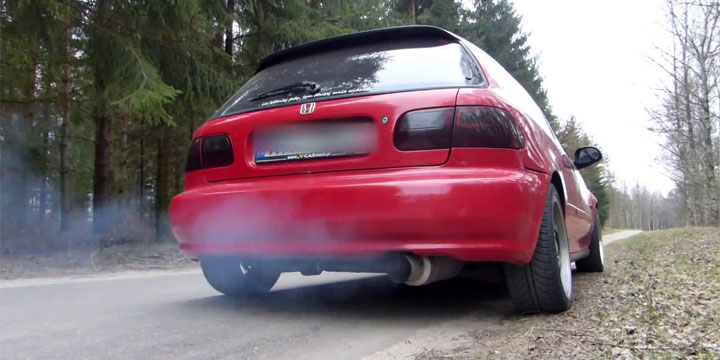
If you notice thick smoke that’s blue-gray or light-gray, this is a good indication your car is burning oil. It’s a sign that oil is leaking into the combustion chamber of your engine, whether it’s faulty seals, bent valves, or another issue.
See Also: 4 Symptoms of a Valve Cover Gasket Leak
#2 – Too Much Oil Being Consumed
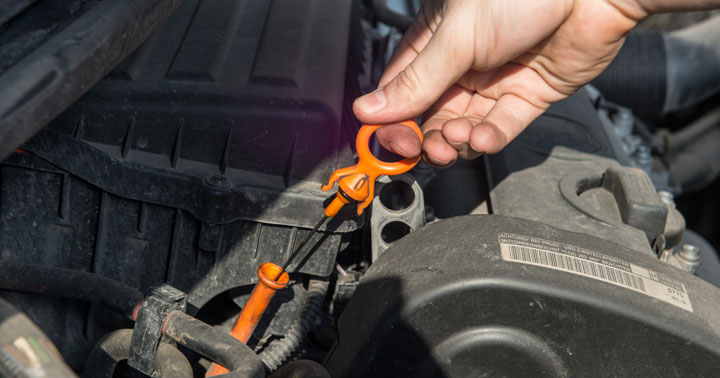
As mentioned above, if the piston rings are worn out or the valve seal is broken, oil will begin to leak into the combustion chamber. This causes your engine to use up its oil supply much quicker.
#3 – Not Enough Accelerating Power

When there is damage to the piston rings and valve seals, compression will be reduced. This causes you to lose engine power. As a result, you won’t be able to accelerate like normal when you put your foot on the gas pedal.
Although bad valve seals and piston rings have similar symptoms, the time and costs of repairing them are quite different. Learning to pinpoint which one is bad by yourself will help save both time and money when taking it to a mechanic for repair.
You can do a compression test to help pinpoint the problem. Remove the EFI fuse and crank the engine. Then check the results on the compression gauge.
In the event your compression test results appear to be average or higher, the valve seals are likely the problem. However, low compression usually indicates that the piston rings are your problem.
To further confirm worn piston rings are the problem, do a wet compression test. Here you open the spark plug and inject a bit of oil (about a tablespoon) into the cylinder. If the compression increases, your piston rings are bad.
Piston Rings Replacement Cost
Best places to order parts? See: 19 Best Online Auto Parts Stores
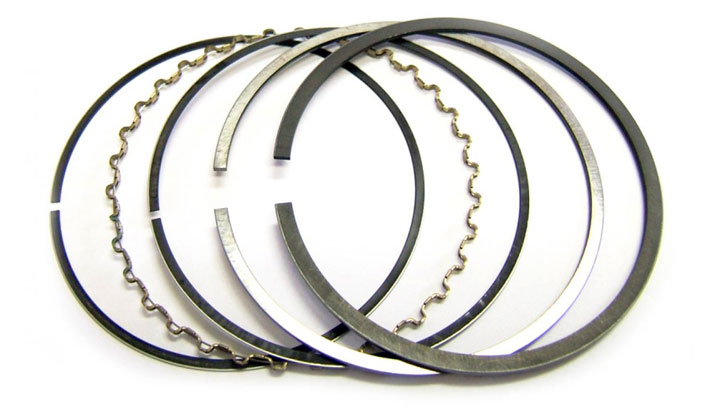
When replacing piston rings, the cost will be determined by several factors. The make and model of your vehicle is one example. You also have to consider the type of engine that’s in your car and its condition.
Most mechanics will charge around $1,500 minimum for this task, up to about $2,500.
The reason this replacement job is so expensive is because it can be quite complicated. The engine must be completely disassembled and the cylinders reconditioned.
After that, the car is reassembled. Only an experienced mechanic can perform this task efficiently, requiring several hours to do so.
See Also: Piston Damage From LSPI
Valve Seals Replacement Cost

If you have discovered there is damage to your valve seals, then have an auto technician install new oil seals. The cost of this replacement job will be between $900 and $1,800, depending on the make and model of your vehicle.
The process of replacing valve seals involves disassembling the entire engine until you can reach the valve spring.
Remove the cylinder head cover, the spark plugs, pushrods, and rocker arms. How long this will take depends primarily on the make and model of your vehicle.
Sometimes the technician will have to dismantle and remove the cylinder head, then use a cylinder kit which contains a cylinder head gasket to replace it.
Read Also: Rear Main Seal Replacement Cost

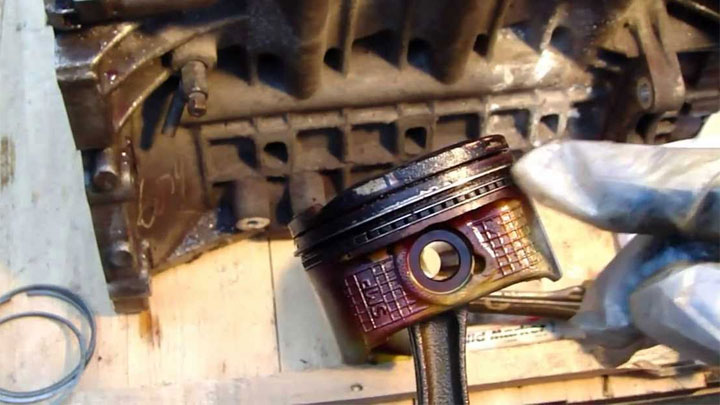

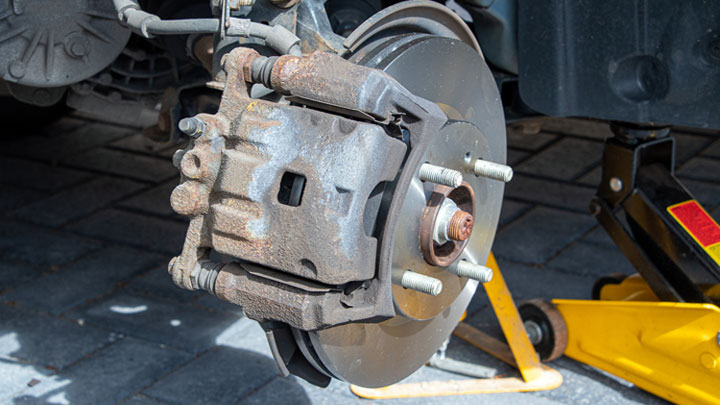
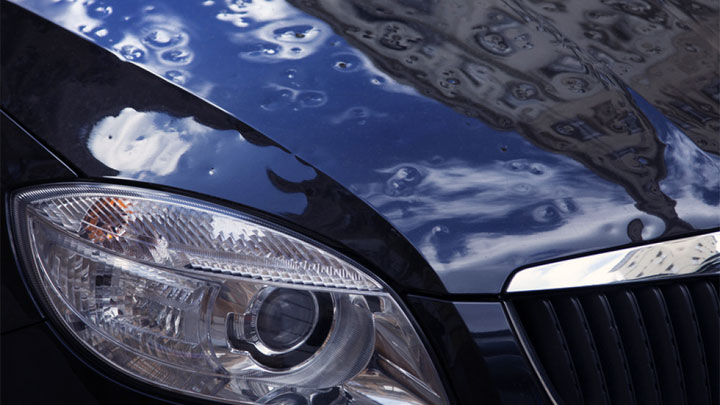
thank you for this page that given me a knowledge about to know the some cause for engine
you are welcome
This was very helpful to me . My ls1 chev engine has good power only smoke when full reeves if drive normal engine runs good and no smoke . Gray tail pips in side . I think oil seals on valves have gone hard as engine has 300.000 ks and has full power just smoke when sitting and drive off fast then gose away . I’m an old machanic I think it’s valves seals
I think that’s a good guess.
1st time I started to hear some noise in my car along with it’s performance is when it start sounding like it was hesitating while I was driving like it was missing: outside of that it appears to drive normal: but the engine light did come on: I call my mechanic he asked me to bring it in but was not able too until the following day, on my way my car started to loose power, and started to hesitate a little worser I got off the next exit , and while approaching the off ramp my car just shut off, and would not start back: there was no smoke, did not run hot, nothing serious that I can tell except that my dip stick jumped out, and oil kinda gotten over the engine I had it told home and replace the pcv still would not start but sound better: then I replaced the plugs, and turning the engine started to turn over over but would not start: so I replaced the ignition coil and it struggle at first to start but within a few seconds it turn over & started but while idling it sounded ruffer than usual, and was Knocking but the Knocking went away I put a quart of oil in it because it was low due to the dip stick coming out, the day it stopped, I shut off the engine, and started it back up there was a little drag but it did start: but when I pulled out it started to kinda level off as I was driving but something else happen that it never did since I had the car, heavy smoke begin to come out of the tail pipe: can’t tell if its white or blue my questionis if it’s the Piston rings what can I do without taking the motor apart.?
You could do a leak down test to determine if it’s the piston rings. You should hear air rushing out of the oil cap area if you have worn piston rings.
Very helpful article. I have a 2002 Toyota Corolla, and I wasn’t expecting this major reapir at 140k miles.
What can cause oil in spark plugs
Most commonly, it’s a leaking valve cover gasket or a spark plug o-ring.
Thank you so much for such a thorough post. It has been my desire lately to educate myself concerning engines. My 1990 Toyota Celica GTS has 200,000 miles. The previous owner did not maintain the engine adequately, so I am reading, studying, troubleshooting, and in most cases, attempting the repairs myself. I look forward to any other articles you may wish to share.
I need an estimate for valve seals replacement for a 2007 Toyota Tundra with a 4.6l engine
Hello, is their an additive that can help with bad valve guides…Tx marshallminer@yahoo.com
An absolute NO!
No additive will fix bad valve seals.
Thanks for this page too!
if I used GUNK heavy duty gel degreaser and original engine degreaser in order to clean up inside of the head and didn’t blow it out completely from under the springs because of hard access in Subaru head. Would the degreaser destroy my valve seals as a brake cleaner would do it by drying them out and cracking?
Gunk Gel Degreaser is only recommended for cleaning heavy deposits specifically on the outside of the engine. if you have heavy deposits inside the head and under the valve cover, youre already in deep doo doo.
Based on what I have read online, it seems that the piston rings in my car are faulty. I have a 2007 toyota camry and it consumes a lot of oil. Even toyota acknowledged it and have extended their warranty. Unfortunately, the warranty doesn’t apply to me as my car is older than 10 years. I end up adding around 1 quart every 500 miles. Is it ok for me to keep adding oil whenever it is low? I don’t want to spend $2K to fix the problem, as I am only planning on using this car for maybe 2 more years. Could there be any serious damage is I keep adding oil and getting oil changes in regular interval?
actually oil will always burn in combustion chamber…and your engine life span will effect in the future, but is okay you can always add the oil and can run the vehicle with smokes blowing from exhaust
just let you know, between a bad piston ring and valve seal mostly same symptoms, and cost replace valve seal is lower than piston ring.
Hi…Thanks for your inputs on this issue. I am also having similar complaints with my 2014 Kia Rondo. It has about 150000 Kms on it and since past one year, it is consuming around 5 Litres of engine oil for every 5000 Kms only as Top Up. On an average, I have to top it up every 800-1000 kms. But there is no blue smoke at all though I have noticed fuel smell inside the car occasionally and a decrease in the engine power lately.
My service mechanic has advised me to replace the engine as the issues with piston rings and valve seals are beyond repair. The replacement cost is around CAD 6000.
It would indeed be wonderful if you can guide me on the best path forward as I intend to use this car for another six months to one year.
1. Can the engine stop running all of a sudden anytime ?
2. Are there any passenger safety issues if I keep running this car ?
3. For how long can I keep adding up the oil and using it ?
Kind Regards
1. possible if you forget to add oil
2. i think no problem while you car run in the short trip and low speed 40 – 60 km/h
3. Depend on how often you use the car
In the article you wrote: Exhaust Smoke – If you notice thick smoke that’s a gray or white color, this indicates that your car is burning oil. What about intermittent light blue smoke. Other online info says it’s also a signal that you’re burning oil. What do you say about blue smoke at times but not always?
bs!
is it better to replaced with a used engine or drop it all together and get a new vic?
depend on your engine condition
it , they say, chrysler 300 6 cyl , has bad “top and bottom” smoke and loud pings . recommend replacement engine. finding one for less than the rings , very hard. what best idea?
My 2010 Toyota Corolla makes has rattling noise and I was told by a mechanic that it was a bent valve however another mechanic friend said that is not because the car runs good plus it just passed the smog check this past month. I bought this car a few weeks ago and I don’t know wether or not last owner maintenance the car or not. What symptoms would my car have it it is a bent valve I don’t count with to much money at this time so i will really appreciate any kind of advice.
When I looked at this it was me sitting in school pretending to read this so I can sit on my phone and do other things so thank you 🙂
My 2.8 diesel engine is not starting after i changed the cylinder head from to new..i have put back everything in place where it is supposed to be..but the engine just turning over and over again but not starting..any idea what it is?
Test compression,spark and fuel delivery….these 3 things are all u need for an engine to run!
At what mileage should I clean my pistons?
every 40.000 km is good
Hi
What are the differences? How can i tell if it’s a bad seal or piston rings other than a compression test? Thanks
How many hours would most mechanics take to change valve seals on a 4 cyl. engine? thanks
some car need to dismantle cylinder head, most car no need (especially 4 cyl car)
approx: 3 – 8 h
Most common job to be done:
-Put piston on TDC
-remove valve cover
-remove camshaft
-remove timing belt / chain
-put air pressure to cylinder through spark plug hole ( to avoid valve comes down)
-remove valve spring
-remove seal
and then drink coffee (as i did to recharge energy, lol)
-fix seal
-fix spring
-fix camshaft
-fix timing belt / chain
-fix valve cover
and so on….
Hi,
my BMW E90 – 2007 320i
has white / grey smoke from exhaust on 1st-2nd gear (acceleration & deceleration). Also the engine isn’t functioning 100% on 1st 2nd gear.
What is the issue? I’ve been told it’s Piston rings, Valve Seals…
WOW YOUR RIGHT ON POINT I BOUGHT A 91 FLEETWOOD I TOOK ONE OF MY MECHANIC’S TO CHECK IT OUT” YA IT SOUND LIKE IT NEEDED MINOR THINGS SO I BOUGHT IT BECUSE MY MECHANIC SAID IT WAS GOOD . I HAD IT TOWED BECAUSE OF THE BAD RADIATOR / NO TAGS SO I LEAVE IT IN THE SHOP A COUPLE DAYS I GO BACK TO THE SHOP MY MECHANIC STARTS IT AND THE CAR SOUNDED GOOD BUT IT BACKFIRED AND THATS WHEN HE TOLD ME NEEDED PISTONS .YOUR PRICE RANGE WAS ON POINT I .SO DO THEY REPLACE THE VALVS SEALS WHILE THEY REPAIR THE PISTONS .HMMM I BETTER CALL AND ASK HIM THAT .THANK YOU FOR SUCH AN INTERESTING PAGE ON CARS ITS VERY INFORMATIONAL I APPRECIATE IT .HAVE A BLESS EVENING . ???☝☝☝☝☝
you are welcome luna lucia
yes it break the engine if you put 1 gallon oil
I just recently changed the piston rings, gasket etc of my Honda car due to the fact that it was emitting white smoke. But after the repair the car is still smoking same whit smoke. My vehicle Mechanics said it should stop soon but I am really worried as to what could be the cause
If it’s white smoke and not just due to normal condensation when first warming up the car, it can mean coolant is leaking into your engine. If it’s more of a light gray or light blue smoke, that would indicate oil leaking. If that’s the case, you may still have some residual oil being burned off from the leaking seals or piston rings which should stop soon. But if it doesn’t go away after a couple days you may still have an issue or different issue.
Hi. You note: “In the event your compression test results appear to be average or better, the piston rings are likely the problem. However, below average results prove that the valve seals are your problem.”
Isn’t that the opposite of what the test means? Smoking with good compression means the rings are in good shape and still maintaining compression, but the seals are worn; while poor compression indicates the rings are shot, and the seals could be either good or bad.
I accidentally flipped what the results should be. It’s now been reworded.
I noticed reduced amount of coolant after a while. My spark plugs gets soaked with oil. Light blue smoke from tail pipe at start up and reduces while in motion. finally shortage of engine oil… Pls what do you think is the problem of my engine
Hmm definitely don’t want to *fill* your cylinder with oil and then immediately do a compression test, as this will hydrolock the engine (worst case scenario) or at least fill your exhaust system with oil (best case scenario).
Also worth noting that these are both jobs that a moderately experienced home mechanic can do with relatively simple tools available at harbor freight or any auto parts store. No need to shell out thousands of dollars fixing it (many cars can get a replacement engine under $2000…my last replacement engine was $100)
Otherwise, nice guide. Could you explain why good compression indicates bad rings, while bad compression indicates bad valve stem seals? I was thinking it would be the opposite. Replacing the valve stem seals tomorrow either way, and if it’s still smoking after that I’m just gonna pull the engine and overhaul it, but would be nice to learn to positively identify which one was failing so I don’t just resort to buying full gasket sets every time this happens.
Thanks for catching that. I reworded some things since the article was not being clear.
Nice expositions there @autotechnician,
I am from Nigeria and I use a Honda Accord, the old 1990s model. I have two issues with the car. Firstly, I see blueish smoke if the car is parked for 3 days, the smokes stop once the car starts moving.
Secondly, when I press my brake pedals for long on a slope or a decline, the pedal starts to go down gradually and the car starts sliding forward or backward depending on the position of the car. Please what could be the problem and what should I do?
Thank you.
The blue smoke is likely oil slowly leaking through your valve seals. When your car is sitting, the oil slowly leaks into the combustion chamber. When you start the car, the oil is burned off.
For the brake issue, check your brake fluid! You probably have a leak somewhere (check the brake master cylinder first). I’d recommend not driving the car until you get the condition fixed.
Just learned my 2005 Freestyle has a bad valve. No compression in #3 cylinder. I’m told $6700 for new engine. I know the car isn’t worth that much, 92000mi (always been serviced regularly), body is in very good condition, no rust. Trying to figure if it is repairable & if so how much it should cost or whether to call the salvage yard. Thanks.
Sorry this happened to you. I’d recommend going to a couple independent shops and getting quotes on replacing with a used engine. Used engines for your car will be plentiful (the shop will have connections on getting one) and not too expensive. Obviously labor costs will be high for an engine swap but nowhere near that $6700 number.
Hello Everyone
I was googling around and this article turned up for my search on top. First of all congrats for that achievement!
I have ‘1.3L Honda City EXI S 2003’ and from two weeks, my exhaust is smoking light blue on start-up and then I can see high RPM while car is parked (not while running)!
Don’t have idea if it smokes during drive – tried a few times on high speed but nothing visible during drive?
While crawling, it jerks like camel if I take-off my feet from accelerator
Oil consumption is quarter in a month (1,000 km) to top-up before next change [using havoline 20w50]
no coolant top-up & no engine heating issues
spark plugs get fouled (dry carbon) in a week same as the exhaust pipe tip
after drive, when I get out of car, there is petrol like smell
fuel consumption is down to 11 km per litre within city with A/c
running condition is normal though, I can do 100-120 km/hr without hesitation
Garage#1- engine tuning, spark plugs and use Hi-octane to clear.
found it useless effort!
Garage#2- guy’s comments match your’s but he has suggested almost everything:
Piston’s Ring
Head Gas Kit
Wall Seal
Oil Seal
Timing Seal
Timing Belt [to be checked]
Timing Bearing [to be checked]
Chamber Join
Silicon
Oil Filter
Engine Oil
Thanks very much for these educational tips, they’ve been too helpful. My engine isn’t smoking but loses oil. This’s why I visited your site.
Is anyone out there that can answer my question are the 2003 Honda Civic I took it into this car Doctor plays in Redlands California to have the oil leak fix well I thought it was fixed but a week later or a few days later I started had to put more oil in it now I’m burning 5 quarts a week almost a quarter day driving 60 miles away from work one way at first I thought oil was getting in through the spark plugs but it burning oil you gets really smell it bad I thought if you had bad valve seals it wouldn’t come and go
How much would I pay for rings&valve seals
I have a 97 dodge ram 5.2 that blows white smoke while idling but not while driving even at slow speeds no smoke. I was told it’s the pistons if so it’s not the prettiest and not worth putting a lot of money into. Is there a kind of addictive to stop the leak if that may be the case? Also to say the engine runs fine I haven’t had any other issue except smoke while idling.
White smoke is generally only caused by normal condensation burn off when cold or a coolant leak somewhere (check your coolant level). Leaking piston rings would give you more of a grayish or blueish smoke. If you don’t want to put money into it, you could always try something like Lucas Oil Stop Leak to see if it helps.
So my car doesn’t smoke out though the exhaust but it does lack of power and eat oil more in long trips and also it has some hard jerks at times what could it be?
Hello there. Great article, very helpful.
With regards to symptom no. 1 below – are you talking about smoke just during startup after a long period (overnight) and then smoke clears? Or smoke while engine and vehicle is running? I have a 2008 Land Cruiser that emits kinda thick white-grayish smoke during startup in the morning and clears after 2-3 minutes.
#1 – Exhaust Smoke
If you notice thick smoke that’s blue-gray or light-gray, this is a good indication your car is burning oil. It’s a sign that oil is leaking into the combustion chamber of your engine.
Thanks!
Louis
I would put money on your valve guide seals with the condition you described. Especially if the smoke billows out upon a cold start up and then goes away after a few minutes of driving. What happens is the oil settles inside the valve train area of the cylinder head after shut down of the engine and starts drooling downward, past the valve guide seals, running down the shaft of the valve and eventually into the combustion chamber and collects there until the engine is started again, which is why it smokes so much in the morning.. hope this helps.
Jason Martini
ASE Certified Technician
Portland, OR
I have a 1995 GMC picku 1/2 ton 350.engine 156000 miles one times it will have a engine rattle and smoke at the same time the clears up. No rattle no smoke. It may go 15 mile or so then does it again. No heat changes or oil pressure changes. It does use a little oil. Maybe a quart between changes. Any ideas.
Hello, So my truck broke down on me ( it started lurching/choking) on my way home and so i brought it into a shop and the guy off top told me i needed to replace the motor that it was going to seize up any mile now and that was going to be like $6,000 or more, I had drive it about 10miles (from it breakingdown) before i brought it in . i cant afford a motor so i just took it home about 3miles.
Got some other possibilitys from a couple mobile mechanics and ending up bringing it back to the repair shop. i asked them to have my heads checked instead of replacing the motor .
when i returned they showed me a broken valve spring said that was my problem. and it would be about $1,500 to fix, they finally finish it about 2 months later and give me a bill for almost $4,000 dollars. ?!?
but in the repairs there is nothing about a valve spring being replaced?
it just says remove and replace left cylinder head x’s 2 and a head test and a bunch of parts and fluid changes ??
Idk i dont know anything about this but it just seems way super high? if someone could give me some in site on what my invoice would look like to replace a left valve spring? I have a 2009 GMC Denali sierra with a 6.2 engine
to replace a valve spring is a relatively easy job.its just removing your rocker cover and then swapping the bad spring for a new one.i could do it and i’m not a mechanic.you’ve been conned,is there not an ombudsman or office of fair trading/consumer protection organisation you can have review your bill?we have them in the United Kingdom.
all the best,
Dave
Thanks so much for this helpful article. I have a Hyundai Santafe 2007 which consumes engine oil so fast that the engine oil level drops to “low” at 2,372 Km after service.
Any info specific to Hyundai would be highly appreciated. Best regards
Nothing Hyundai specific, but you’ll want to check to make sure the vehicle isn’t leaking any oil. If you pop the hood, is there a strong oil smell? Common leak points that are not model specific are the valve cover gasket, oil pan, cam seals, and main seals.
If you are consuming oil this quickly and haven’t noticed a leak, it may be entering the combustion chamber. When you start the car, see if any blue smoke comes out of the exhaust. Blue smoke indicates burning oil.
You may want to have the radiator checked for hydrocarbons. This may indicate a head gasket failure. A failed head gasket could allow oil to leak into the cooling system, but would likely also be accompanied with overheating issues.
I have a Daewoo cielo with G15MF Engine,I noticed the vehicle was lacking power when I engage in gear,it was found that two plugs where being submerged in oil,can this be the problem?
It could be, yes. You might want to change plugs, but figure out where that leak is coming from. You may need a new valve cover gasket or something like that.
Yes the high chemical will destroy it please don’t do it
Nice article very informative about cars and common engine troubleshooting that car owners face once a while… I’m Victor from Nigeria, I drive a ’94 VW Golf MK3 . Its a small yet tough automobile. Anyway, I had it “ringed” couple days back yet it still emits a light ashy colored smoke and the new oil I replaced is all dark on the dipstick and its shorts oil, finally all the pistons except cylinder 2 which is deeply soaked have oil residues on the cylinder heads and the car jerks when in motion prbly cuz of low pressure.
My 2012 Chevy Equinox is using a lot of oil & is involved in a recall that I was unaware of. I’ve passed the 120,000 mile limit on the recall so trying to decide what to do. Can I just keep putting oil in the car to make sure it never runs low or is there any other possible cause for this besides expensive repairs of possible bad valve seals/piston rings? Im going to sell the car soon & it has 121,944 miles on it.
There are many possible causes of burning or leaking oil, including bad valve guide seals, bad piston rings, bad front or rear main seals, bad camshaft seals, head gasket leaks, and incorrect oil viscosity, to name a few. It’s impossible to say exactly what is burning oil until you have your vehicle diagnosed at a shop, though.
Do keep putting oil in it so you don’t ruin the engine, but I’d get the burning oil issue addressed as soon as possible. All that burnt oil is not good for the environment and you may fail a smog test if it persists.
My isuzu elf truck 2007 model 4jj1 engine smokes after idling when you press the petrol pedal and some engine oil leaks around the tarpet cover
My BMW blow blue smoke on start up for 5 seconds and is also burning a lot of oil after been driven fast on motor way. Went from max oil on dipstick to min after fast motorway journey. When driving short journey not fast, oil stays same level. Help
I’d do a leak down test. The leak down test will tell you more information about where you’re losing oil, but tends to cost a little more than a standard compression test. This should help you narrow down the problem and determine next steps.